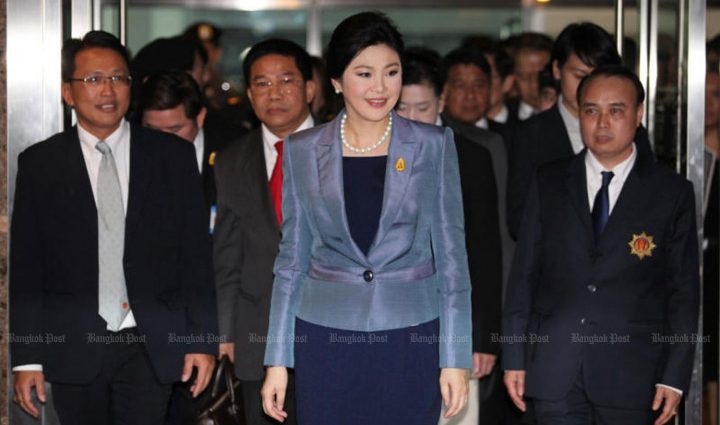Supreme Court division for politicians to rule on contested transfer of former national security chief
PUBLISHED : 9 Nov 2023 at 17:17

The Supreme Court’s Criminal Division for Holders of Political Positions has postponed until Nov 29 the reading of its decision on an abuse of power case against fugitive former prime minister Yingluck Shinawatra.
The case filed by the Office of the Attorney General centres on the abrupt transfer of Thawil Pliansri, the then secretary-general of the National Security Council, to be an adviser to the prime minister when Yingluck was prime minister in 2011.
The move amounted to abuse of power in violation of Section 157 of the Criminal Code and of the Anti-Corruption Act, the suit alleges.
The court completed its examination of six prosecution and four defence witnesses early this year and was scheduled to deliver its ruling on Thursday at 1.30pm.
Winyat Chartmontree and Norawich Laelaeng, Yingluck’s lawyers, appeared at the Criminal Court to hear the ruling, only to be told that it had been postponed to Nov 29 at 1.30pm.
Mr Norawich said the postponement was made after one member of the panel of judges was unable to appear for the ruling.
The alleged abuse of power took place on Sept 30, 2011 when Yingluck signed a prime minister’s order for Mr Thawil to be transferred to an advisory post. On the same day, the cabinet passed a resolution to appoint Pol Gen Wichian Potphosri, the then national police chief, to replace Mr Thawil at the NSC.
Mr Thawil filed a petition with the Supreme Administrative Court, arguing the transfer order was illegitimate. The court ordered the revocation of the prime minister’s order.
The Constitutional Court subsequently ruled that Yingluck had illegally interfered in the transfer of government officials.
On July 1, 2020, the National Anti-Corruption Commission ruled there were grounds to find Yingluck had been dishonest in performing her duties and recommended the attorney general file a lawsuit against her in the Supreme Court’s Criminal Division for Holders of Political Positions.
A warrant for Yingluck’s arrest was issued when she failed to appear before the court for the first hearing of the case in November 2022 without giving a reason.
Yingluck cried foul over the warrant, saying she had been the victim of relentless persecution in the Thawil case.
Yingluck, 56, has been on the run since August 2017, when she failed to appear in court for the reading of its ruling on dereliction of duty in a rice-pledging programme that ran up at least 500 billion baht in losses, some of it from corruption. She was subsequently sentenced to five years’ imprisonment.
Her elder brother Thaksin returned to the country on Aug 22 after more than 15 years of self-exile abroad. He was immediately sentenced to eight years in prison in three cases — later reduced to one year under a royal pardon — for abuse of authority and conflict of interest while serving as premier prior to 2006.
Thaksin, 74, spent only 12 hours in prison before being transferred to Police General Hospital, where he has had two operations and continues to be treated for a variety of ailments.

Thawil Pliansri arrives at the Constitutional Court on May 5, 2014 to hear testimony from then prime minister Yingluck Shinawatra about his transfer. (Bangkok Post file photo)

